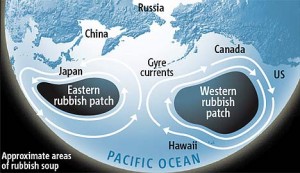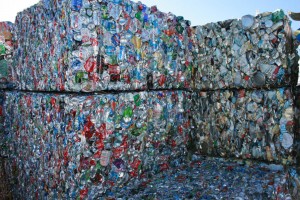
Pacific rubbish soup
As many people know, there is a huge and ever-increasing mountain of rubbish growing in the middle of the Pacific, like a giant festering ’soup’, much of which consists of plastic packaging waste. This has had a massive knock-on affect in the form of polluted beaches on islands throughout the South Pacific, such as the popular Kamilo beach in Hawaii.
A British company believe that they have a packaging remedy. Symphony Environmental has created a substance that can be added to plastic materials to speed up the degradation time from several decades to just a few months.
Apparently “The special additive, called d2w, is put into plastic products when they are being manufactured. It works by weakening the carbon bonds, lowering the material’s molecular weight and eventually causing a loss of strength. The plastic can be given a set lifespan, depending on what purpose it is ultimately intended for.”
The aim is to get bread bags for instance to degrade in a matter of weeks and other items, designed for a longer shelf-life to degrade over many months.
This sounds great in theory and clearly a lot of research has taken place since this company was set up in 1995. We are in favour of any initiatives that help reduce/manage packaging waste. However, there are a number of issues that need to be clarified and addressed (if they haven’t been already).
What happens when one freezes items such as bread, to extend shelf-life? Will the degradation process be retarded or halted? Many items, such as toiletry products are used way beyond their stated shelf life. Does that mean that these items could degrade in the cupboard whilst still in-use?
It is also interesting to note that there seems to be “stern opposition from rivals” as the “plastics industry is split into two camps”: There are those that back ‘oxy-biodegradable’ (like dw2) that breaks-down simply with contact with air and those that back ‘bio-degradable’, which require more specific conditions such as burial in the ground and elevated temperature, to work.
I’m not so sure that there is such a defined “split” within the industry and can see the merits and issues of both of these approaches and, in our opinion, both should continue to be developed. In terms of ‘Oxy-biodegradable’, as I’ve already mentioned above, degradation before end of shelf-life/use is an issue and what happens if a product is, for instance, left in direct sunlight – will this alter the degradation time frame? As far as ‘Bio-degradable’ goes – it is my understanding that unless specific elevated temperatures are reached, degradation will not commence. So, for it to work properly, industrial bio-degradation facilities are required – these materials will not degrade properly in a normal household composting bin.
Michael Stephen of Symphony also talks about bio-producers having convinced British farmers that “crop-based plastics are best” but that “this is wrong…because when they are recycled they give off methane”. On top of this there area a number of concerns with these products around the use of scarce food resources to make packaging.
All of these materials could also present a potential issue of contaminating ‘normal’ recycling waste if not clearly identified & managed properly and I’m not sure that this issue is being addressed. Chris Penfold
What do you think? Let us know.
Taken from an article written by Ben Marlow which appeared in the UK Sunday Times on 7th March 2010. You can read the full article at the Times Online here: Great Pacific Garbage Patch article




